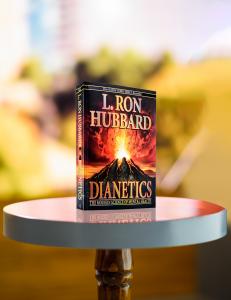AI Therapy Collapses Under Scrutiny—Decades of Results Reveal the Lasting Solution
LOS ANGELES, CA, UNITED STATES, September 24, 2025 /EINPresswire.com/ -- Global health leaders warn of a growing crisis. Nearly 60 million U.S. adults report that they are currently living with a mental illness, yet half receive no treatment at all (1). Into this widening gap have rushed thousands of unregulated, AI-powered therapy apps and wellness platforms, all lured by promises of convenience and emotional support. But instead of delivering relief, they often leave users emotionally worse off, confused and misled (2).
As app developers race to monetize emotional pain (3), and with more than 80% of users abandoning some platforms within just 30 days due to lack of benefit (4), the demand for a real, effective solution has never been more urgent.
In contrast to the confusion of digital gimmicks and quick-fix solutions, the book Dianetics: The Modern Science of Mental Health by L. Ron Hubbard has helped individuals achieve lasting mental clarity and emotional stability for 75 years. Its structured, hands-on method, known as auditing, doesn’t rely on harmful drugs, therapists or digital apps. Instead, it targets the reactive mind, the hidden source of irrational thoughts, stress and emotional burden. And instead of masking symptoms, auditing addresses the root cause, helping individuals permanently get rid of emotional pain and regain full control over their thoughts, decisions and lives.
One reader says, “This book completely transformed my life. For years, I struggled with anxiety and anger, and Dianetics didn’t just explain the root of it, it gave me a real and workable solution. Through auditing, I experienced immediate relief and finally felt in control of my thoughts and emotions.”
Unlike therapy apps that gamify emotions or AI chatbots that attempt to fake empathy, auditing produces real, measurable change. People report clearer thinking, improved emotional stability and increased energy, often within just hours of applying its techniques. These results stand in sharp contrast to the growing evidence of failure in today’s “digital mental health field.”
The latest statistics expose a harsh reality. A 2025 report from Harvard warns that emotional-wellness apps can create dependency, worsen symptoms and mislead users with false promises (5). The FTC has already cracked down on apps for privacy violations and unsubstantiated health claims (6). And yet, millions keep downloading and abandoning these apps with nothing to show for it but frustration and wasted time.
Dianetics remains a consistent force in the self-help and mental wellness arena, with over 20 million copies sold, available in more than 50 languages and backed by decades of results. In a world full of quick fixes and emotional clickbait, it offers something rare: a method that works, lasts and truly empowers people.
Bridge Publications, located in Los Angeles, California, is the publisher of the nonfiction works of international best-selling author L. Ron Hubbard. For more information, visit www.bridgepub.com and www.dianetics.org.
References:
1) Mental Health America. "MHA Releases 2024 State of Mental Health in America Report." 29 Jul. 2024, www.mhanational.org/news/mha-releases-2024-state-of-mental-health-in-america-report/.
2) Cox, David. “‘They Thought They Were Doing Good but it Made People Worse’: Why Mental Health Apps Are Under Scrutiny.” The Guardian, 4 Feb. 2024, www.theguardian.com/society/2024/feb/04/they-thought-they-were-doing-good-but-it-made-people-worse-why-mental-health-apps-are-under-scrutiny.
3) Singh, Jagmeet. “Wysa Raises $20 Million to Expand its Therapist Chatbot into a Wider Set of Mental Health Services.” TechCrunch, 14 Jul. 2022, www.techcrunch.com/2022/07/14/wysa-20-million-series-b-funding-expand-therapist-chatbot-wider-mental-health-services/.
4) Fürtjes, Sophia, et al. “Characteristic of Mental Health App Usage: A Cross-Sectional Survey in the General Population.” BMC Public Health, 12 Nov. 2024, www.bmcpublichealth.biomedcentral.com/articles/10.1186/s12889-024-20500-1.
5) Pazzanese, Christina. “Got Emotional Wellness App? It May Be Doing More Harm Than Good.” Harvard Gazette, 25 Jun. 2025, www.news.harvard.edu/gazette/story/2025/06/got-emotional-wellness-app-it-may-be-doing-more-harm-than-good/.
6) Federal Trade Commission. “FTC to Ban BetterHelp from Revealing Consumers’ Data, Including Sensitive Mental Health Information, to Facebook and Others for Targeted Advertising.” 2 Mar. 2023, www.ftc.gov/news-events/news/press-releases/2023/03/ftc-ban-betterhelp-revealing-consumers-data-including-sensitive-mental-health-information-facebook.
Josie Gibson
Bridge Publications
+1 323-888-6269
email us here
Legal Disclaimer:
EIN Presswire provides this news content "as is" without warranty of any kind. We do not accept any responsibility or liability for the accuracy, content, images, videos, licenses, completeness, legality, or reliability of the information contained in this article. If you have any complaints or copyright issues related to this article, kindly contact the author above.

